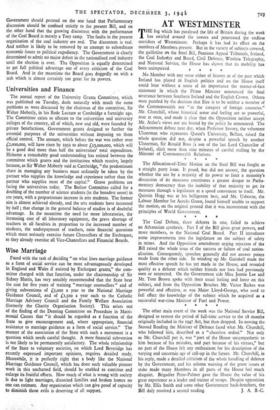AT WESTMINSTER
THE fog which has paralysed the life of Britain during the week has swirled around the towers and penetrated the endless corridors of Westminster. Perhaps it has had its effect on the numbers of Members present. But in the variety of subjects covered, the guillotine on the Steel Bill, Pensions Appeal Tribunals, Ireland, the Coal Industry and Board, Civil Defence, Wireless Telegraphy, and National Service, the House has sh,own that its mobility has
been unimpaired. * * * *
No Member with any sense either of history or of the part which Ireland has played in English politics and on the House itself could hear without a sense of its importance the matter-of-fact statement in which the Prime Minister announced the final severance between Southern Ireland and the English Crown. Others were puzzled by the decision that Eire is to be neither a member of the Commonwealth nor "in the category of foreign countries." Mr. Churchill, whose historical sense and feeling are so powerful, rose at once, and made it clear that the Opposition neither accept Mr. Attlee's views nor are bound by the policy he announced. The Adjournment debate next day, when Professor Savory, the vehement Ulsterman who represents Queen's University, Belfast, raised the whole question did not, despite a powerful speech by another Ulsterman, Sir Ronald Ross (a son of the last Lord Chancellor of
Ireland), elicit more than nine minutes of careful stalling by the Minister of Commonwealth Relations.
The Allocation-of-Time Motion on the Steel Bill was fought as a straight party issue. It posed, but did not answer, the question whether the use by a majority of its power to limit a minority's discussion of its measures constitutes a greater danger to Parlia- mentary democracy than the inability of that majority to get its measures through a legislature at a speed convenient to itself. Mr. Quintin Hogg was at his belligerent best, and Mr. Usborne, the Labour Member for Acocks Green, found himself unable to support the motion, on the original ground that it was inconsistent with the principles of World Government. * * The Coal Debate, three debates In one, failed to achieve an Athanasian synthesis. Part I of the Bill gives great powers, and more members, to the National Coal Board. Part II introduces some improvements into the legislature on the subject of safety in mines. And the Opposition amendment urging rejection of the Bill raised the whole issue of the success or failure of coal nation- alisation. Consequently, speeches generally did not answer points made from the other side. In winding up Mr. Gaitskell made the most effective speech he has yet made in the House, and revealed quality as a debater which neither friends nor foes had previously seen or suspected. On the Government side Miss Jennie Lee and
Mr. Tom Brown spoke with their usual feeling and force on this subject, and from the Opposition Benches Mr. Victor Raikes was powerful and effective, as was Major Lloyd-George, who used to full effect the knowledge of the subject which he acquired as a
successful war-time Minister of Fuel and Power.
* *
The other main event of the week was the National Service Bill, designed to restore the period of full-time service to the 18 months originally included in the 1947 Act, but then dropped. In moving the Second Reading the Minister of Defence faced what Mr. Churchill, who followed him, described as a "cheerless ordeal." Not only as Mr. Churchill put it, was "part of the House unsympathetic to him because of his mistakes, and part because of his virtues," but no part of the House felt any enthusiasm for his description of the varying and uncertain age of call-up in the future. Mr. Churchill, in his reply, made a detailed criticism of the whole handling of defence by the Government, and his solemn warning of the grave issues at stake made many Members in all parts of the House feel much disquiet. Brigadier Prior-Palmer gave the House the value of his great experience as a leader and trainer of troops. Despite opposition by Mr. Ellis Smith and some other Government back-benchers, the


































 Previous page
Previous page